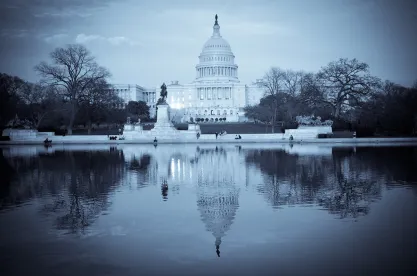Uh-oh: Government Shutdown Chances Increase. The Buzz continues to monitor the potential for a federal government shutdown. Last week, we noted a positive development: leadership in both the U.S. Senate and U.S. House of Representatives appears to agree that a short-term continuing resolution will be necessary to avoid a federal government shutdown on October 1, 2023. This week, on the other hand, brings a not-so-positive development. The House Freedom Caucus (comprised of roughly thirty Republican members), issued a statement noting that they will not support a continuing resolution that fails to include a separate border security bill (which the House passed in May 2023)—or one that fails to address policies at the U.S. Department of Justice and the Pentagon with which these representatives disagree. With the thin majority in the House, this means that if Freedom Caucus members remain committed to these demands, the House would not be able to pass a continuing resolution unless they convince some Democrats to vote with them. This could make getting a continuing resolution through the House particularly challenging.
NLRB Returns to 2014 “Ambush” Election Rules. On August 25, 2023, the National Labor Relations Board (NLRB) issued a direct to final rule amending its union election procedures. The rule rescinds changes that the Board made in 2019 to its election procedures and reinstalls the 2014 election procedure rule. According to the rule’s preamble, the latest changes “will enable the Board to better fulfill its duty to protect employees’ rights by fairly, efficiently, and expeditiously resolving questions of representation.” Some of the major changes include the following:
-
The pre-election hearing will be scheduled to eight calendar days from service of the notice of hearing. Regional directors may only postpone this hearing for up to two days upon a showing of “special circumstances.” In contrast, the 2019 rule set the pre-election hearing fourteen business days from service of the notice of hearing.
-
The employer’s statement of position will be due seven days from the notice of hearing.
-
The rule eliminates the 2019 requirement for the petitioning union to file a statement of position.
-
The rule limits the scope of the pre-election hearing to determining whether a question of representation exists. Issues concerning the scope of the unit and voter eligibility, which had been traditionally debated at this hearing, will not be litigated under the new rule.
-
Post-hearing briefs are only permissible at the regional director’s special permission.
-
Employers will have two, as opposed to the current five, business days to post the notice of petition for election.
-
The rule requires elections to be scheduled at “the earliest date practicable” and eliminates the twenty-business day waiting period.
Although the Board forecasted these changes on the biannual regulatory agenda, because it is a direct to final rule, it did not seek input from the public on the changes. The new rules become effective on December 26, 2023. Eric C. Stuart, C. Thomas Davis, and Zachary V. Zagger have the details.
Wilcox Out … For Now. Speaking of the Board, Democratic Member Gwynne Wilcox’s term expires on August 27, 2023. President Biden has renominated Wilcox for a second term, and Senate Majority Leader Chuck Schumer (D-NY) has teed up a confirmation vote on her nomination for some time after the U.S. Congress’s August recess. Because President Biden has bucked tradition and has not paired Wilcox with a Republican nominee to fill the seat vacated by John Ring in December 2022, if Wilcox is confirmed, the Board would remain at a 3-1 Democratic majority. There is usually a flurry of activity surrounding the expiration of a Board member’s term, so employers should be on the lookout for a final joint-employer regulation.
EEOC Implements New Strategic Plan. On August 22, 2023, the U.S. Equal Employment Opportunity Commission (EEOC) announced the adoption of its strategic plan for the coming years. The Strategic Plan for Fiscal Years 2022-2026, which went into effect immediately, sets forth the Commission’s three primary strategic goals:
-
“Combat and prevent employment discrimination through the strategic application of the EEOC’s law enforcement authorities.” As part of this goal, the EEOC emphasizes its Systemic Program, which makes “the identification, investigation, and litigation of systemic discrimination cases (pattern or practice, policy, and/or class cases where the alleged discrimination has a broad impact on an industry, profession, company, or geographic area) a top priority.” This includes “enhanced monitoring of conciliation agreements.”
-
“Prevent employment discrimination and advance equal employment opportunities through education and outreach.” This includes providing “technical assistance to underserved segments of the employer community” as well as an effort to “[t]arget outreach to small, new, and disadvantaged/underserved employers.”
-
“Strive for organizational excellence through our people, practices, and technology.” The purpose of this goal is “to ensure the agency is held accountable for improving its operations where necessary,” and focuses on the “effective management of financial and technological resources.”
The document is separate from another similarly named document—the Strategic Enforcement Plan for Fiscal Years 2023-2027—that outlines the Commission’s substantive areas of focus from an enforcement standpoint.
Congress Gets “Tough on Crime.” This week in 1994, Congress passed the Violent Crime Control and Law Enforcement Act of 1994. Often referred to as the 1994 Crime Bill or Clinton Crime Bill, the bill marks a watershed moment in the history of federal legislative crime efforts. Then-senator Joe Biden drafted the Senate version of bill, which is the largest crime bill in the history of the United States (both in terms of provisions and funding), and includes the Violence Against Women Act (VAWA), the federal assault weapons ban, increased federal death penalty offenses, and a requirement for states to establish sex offender registries, among other provisions. The legacy of the act remains a subject of political debates today.




 />i
/>i

